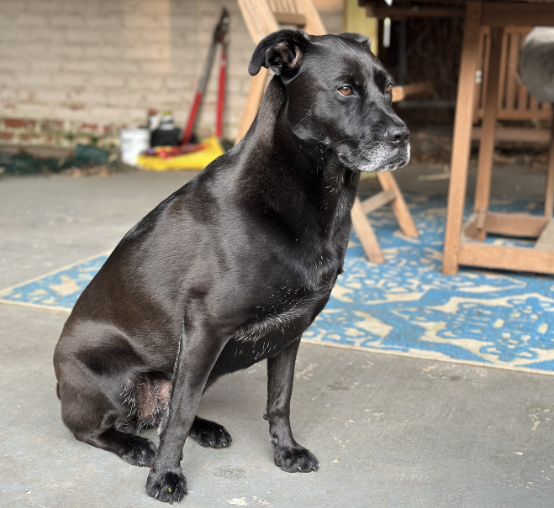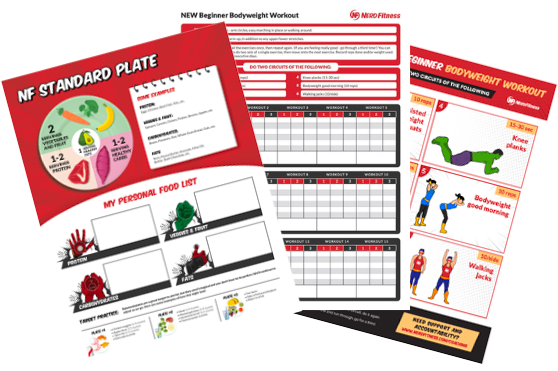A few months ago, our finely-tuned daily routine with our dogs fell apart.
This is Pepper and Olive:

In addition to a few personal chaotic setbacks, we also had a construction project that totally destroyed our backyard, where our dogs wrestle and run around.
After an unbelievably humid summer/fall, no backyard for Pep and Olive to run around in, and a few extra snacks here and there…
We noticed that Pep was looking a bit more plump than usual.
According to the vet, Pep should weigh 43-ish pounds for her size and age.
She weighed in at 49 pounds.
Quick side note: studies show that dogs who are considered overweight (10-20%+ above normal weight) can have reduced life spans compared to their leaner counterparts. This labrador retriever study showed lean dogs lived 2+ years longer than their overweight siblings.
We want Pep to be happy and healthy and around for as long as possible, with the highest quality of life possible.
Which means we are prioritizing her health and weight loss!
Here’s exactly what we did:
- We only fed her at 7:07AM, and 6:54PM, the optimal meal time according to Instagram.
- We signed up for a dog kickboxing-salsa-dance class for max fat-burning cardio.
- We bought a puppy cold plunge to use each morning to burn visceral fat.
- We put Pepper on a low-carb diet to prioritize ketosis and fat burning.
- We stocked up on organic dog supplements to add to her meals.
Kidding.
We did none of that.
We slightly reduced the portion sizes of her meals, cut back on the extra snacks she’s getting in between meals, and prioritized more walks while our backyard remains a mess.
Unsurprisingly, since then, Pep already has more…pep in her step (sorry not sorry), and she has lost a few pounds, which puts her closer to the healthy weight category. The backyard is back in action and Pep is too.

Now, I know what you’re thinking:
“Duh, Steve. Of course that’s how you get a dog to lose weight. Smaller meals, fewer snacks, and more exercise.”
And then I also know what you’re thinking next:
“Aw crap, Steve was this an extended metaphor about how we tend to overcomplicate things?”
Occam’s Razor Scooter
When we are struggling with something, be it weight loss, sticking with a diet, following a workout plan, or trying to build a new habit…
The internet is ready to sell us a complicated solution, especially when it comes to our metabolism:
- Snacks that are “healthy” and “pure.” Just don’t pay attention to the calorie count!
- Supplements guaranteed to change our lives (and empty our wallets).
- Diets based on our blood type or astrological sign or starter Pokémon.
- Expensive cold plunges and saunas.
- Secret workouts and high-tech workout equipment.
The companies and people who promote this stuff need to convince us to “major in the minors.” They hit us with complicated problems, pseudoscientific terms, and are ready to sell us convoluted solutions.
They want us to focus on those tiny things that are very expensive and might result in a bit of progress.
Occam’s Razor teaches us that “the simplest explanation is usually the correct one.”
For example, the law of thermodynamics is real, which means we need to consume fewer calories on a regular basis over many months and years to lose weight. Simple.
(Notice I said “simple,” not “easy”!)
Of course eating more vegetables and whole grains and lean protein will likely make us healthier, but we already know this.
Instead, we need to pick a dietary strategy that we can stick with for the long term.
This could be low-carb, or low-fat, or intermittent fasting, or the Mediterranean diet, etc. Whichever one we can actually stick with? That’s the strategy for us!
Let’s talk about workouts. Most of us follow the same journey:
- Me starting out: I should just focus on the basics. Squats, push-ups, pull-ups, walking.
- 5 years into training: I am gonna balance on a bosu ball while doing arm curls and lunges simultaneously for maximum burn!
- Now: I just focus on the basics. Squats, push-ups, pull-ups, walking.
Simple. Effective. Manageable.
Once we learn about Occam’s Razor, we’ll see it everywhere!
We can then stop overcomplicating the simple solutions staring us in the face, and get to work on building the habit of doing the simple stuff repeatedly.
What part of your healthy journey are you overcomplicating unnecessarily?
I think you’ll be surprised what “simple, done consistently” can do over the long term.
-Steve


